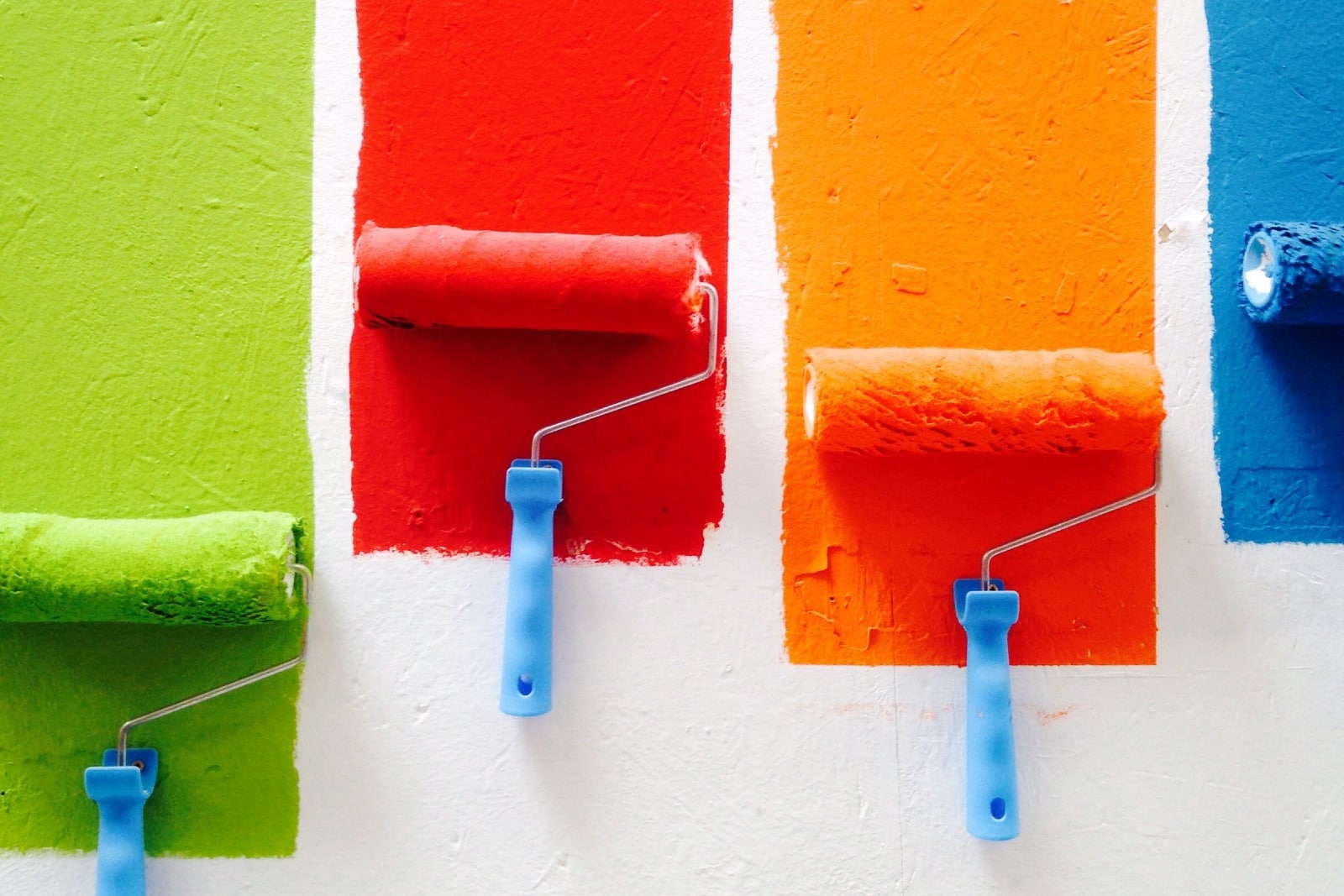
180+ Italian Nouns for Beginners
If nouns are the names of people, places or things, what “people, places and things” are most important and relevant to Italians?
You’ll learn about 180 of them in this post.
You’ll see the nouns that could easily crop up in your conversations with native speakers or appear on a written page. Take note, beginning learners: familiarizing yourself with the nouns presented here will give you a leg up in acquiring the language!
Contents
- 180+ Common Italian Nouns
- How to Spot Italian Noun Genders
- How to Form Plural Italian Nouns
- How to Use Italian Articles
- And One More Thing...
Download: This blog post is available as a convenient and portable PDF that you can take anywhere. Click here to get a copy. (Download)
180+ Common Italian Nouns
1. Family
You don’t have to watch all nine hours of “The Godfather” trilogy before you understand that family is central to the Italian character and culture. Italian families are tight-knit.
And it doesn’t matter if you’re 40, your parents and grandparents will always hold sway in the decisions that you make. You’ll easily find households with three generations living under one roof.
So when you talk to a native speaker and want to know more about him or her, soon enough you’ll hear the person talk about his or her family. Here are some of the members of the extended family:
- Il padre (father)
- La madre (mother)
- I genitori (parents)
- Il fratello (brother)
- La sorella (sister)
- Il marito (husband)
- La moglie (wife)
- Il bambino / la bambina (baby / child)
- Il figlio / la figlia (son / daughter)
- Lo zio / la zia (uncle / aunt)
- Il nonno / la nonna (grandfather / grandmother)
- Il nipote / la nipote (nephew / niece)
- Il cugino / la cugina (cousin)
- Il fidanzato / la fidanzata (fiancé / fiancée)
- Il patrigno / la matrigna (stepfather / stepmother)
- Il suocero / la suocera (father-in-law / mother-in-law)
- Il cognato / la cognata (brother-in-law / sister-in-law)
Learn more about Italian family nouns here:
Family in Italian: 107 Useful Words | FluentU Italian Blog
Family in Italian is much more complicated than la famiglia. These 107 Italian family words will teach you everything you need to know about addressing your in-laws and…
2. Food
All cultures love to eat. But in Italy, food is an obsession. Food is elevated to a religion. Recipes are part of a family’s history. Food is personal, and dishes, ingredients and cooking techniques are deeply held secrets and are part of the family heritage. The veneration for culinary traditions is well-founded. Open your mouth, and that first bite of risotto will make a believer out of you.
Here are food-related nouns you should know:
- Il cibo (food)
- La colazione (breakfast)
- Il pranzo (lunch)
- La cena (dinner)
- Il pane (bread)
- Il formaggio (cheese)
- Il vino (wine)
- Il caffè (espresso coffee)
- Il latte (milk)
- Il tè (tea)
- La torta (cake)
- Il panino (sandwich)
- La carne (meat)
- La bistecca (steak)
- L’insalata (salad)
- Il sale (salt)
- Il burro (butter)
- La frutta (fruit)
- La verdura (vegetable)
- Il piatto (plate)
- Il cucchiaio (spoon)
- La forchetta (fork)
- Il coltello (knife)
- Il bicchiere (glass)
- Il tavolo (table)
Learn more about food-related Italian nouns here:
180+ Italian Restaurant Phrases and Vocabulary | FluentU Italian Blog
Learning Italian food vocabulary will help you have a delicious and authentic Italian culinary adventure on your next trip to Italy! In this post, you’ll find 180+ Italian…
3. Jobs and Occupations
It’s right there written on the very first line of the very first Article of the Italian Constitution: Italy is a Democratic Republic, founded on work.
Italians are a hardworking bunch. The economy may go high or low, but the Italians will be working as hard as ever.
Here are some nouns related to work titles and designations. You’ll notice that some nouns have a masculine form and a feminine form, depending on whether the person referred to is male or female. For other nouns, you have the same form for both male and female.
- L’insegnante (teacher)
- Il medico (doctor)
- L’avvocato (lawyer)
- L’ingegnere / l’ingegnera (engineer)
- Il cameriere / la cameriera (waiter)
- Il contadino / la contadina (farmer)
- Il commesso / la commessa (shop assistant)
- Il venditore / la venditrice (salesman / saleswoman)
- L’impiegato / l’impiegata (employee)
- Il segretario / la segretaria (secretary)
- Lo scrittore / la scrittrice (writer)
- Lo studente / la studentessa (student)
- Il casalingo / la casalinga (househusband / housewife)
- Il pensionato / la pensionata (pensioner)
- Il disoccupato / la disoccupata (unemployed)
4. Politics and Government
Find a gaggle of people in the piazza (town square) and before long, politics will be the topic of conversation. Italians love talking about politics and their government.
Here are some nouns you might want if you plan to embroil yourself in conversations about Italian politics:
- Il primo ministro (prime minister)
- Il giornale (newspaper)
- Il congresso (congress)
- Il parlamento (parliament)
- Il legislatore (lawmaker)
- Il deputato / la deputata (deputy)
- Il cittadino / la cittadina (citizen)
- L’elezione (election)
- La bandiera (flag)
5. Fashion and Shopping
Gucci, Valentino, Versace, Fendi and Armani…no, that’s not a nursery rhyme or a class roll. Italy houses the international headquarters of the most famous fashion brands in the world. Italians, both men and women, know their fashion.
And if you happen to be in the country and are hardcore shopping, it pays to have these nouns in your pocket:
- La banca (bank)
- I contanti (cash)
- I soldi (money)
- La carta di credito (credit card)
- La firma (signature)
- Il negozio (store)
- Il mercato (market)
- La maglietta (t-shirt)
- I pantaloni (pants)
- Le scarpe (shoes)
- La borsa (bag)
- Il cappello (hat)
- Il cappotto (coat)
- L’abito (suit)
- Il vestito (dress)
- L’accessorio (accessory)
- La cintura (belt)
- La collana (necklace)
- L’anello (ring)
- Gli orecchini (earrings)
- Il braccialetto (bracelet)
6. Hobbies
Italians know how to work…and play. And they love talking about their hobbies and passions. Included here are some nouns related to the most common sports and hobbies Italians love:
- I passatempi (hobbies)
- Lo sport (sport)
- Il calcio (soccer)
- La pallavolo (volleyball)
- La pallacanestro (basketball)
- Il ciclismo (cycling)
- Lo sci (skiing)
- Il tennis (tennis)
- La spiaggia (beach)
- Il libro (book)
- Il film (movie)
- L’attore (actor)
- L’attrice (actress)
- La musica (music)
7. Everyday Objects
Going through life, whether at home or in the office, you come across objects that you always see or use. It pays to have these Italian nouns in memory so you can communicate about them and tell your native speaker friend that you need a new bar of sapone (soap):
Things Around the House
- La casa (house)
- La camera da letto (bedroom)
- La cucina (kitchen)
- Il bagno (bathroom)
- La porta (door)
- La finestra (window)
- Le scale (stairs)
- Il soffitto (ceiling)
- Il tetto (roof)
- Il letto (bed)
- L’orologio (clock)
- Il cuscino (pillow)
- La coperta (blanket)
- Il sapone (soap)
- Lo specchio (mirror)
- L’asciugamano (towel)
- La scopa (broom)
- Il ferro da stiro (iron)
- Il frigo (fridge)
- La lavatrice (washing machine)
Transportation Words
- L’automobile (car)
- L’autobus (bus)
- La bicicletta (bike)
- Il treno (train)
- Il camion (truck)
- L’aeroplano (airplane)
- La barca (boat)
Work-related Nouns
- L’ufficio (office)
- La fabbrica (factory)
- L’azienda (company)
- L’officina (workshop)
- Il collega (colleague)
- Il superiore (superior)
- Il computer (computer)
- Il portatile (laptop)
- Lo schermo (monitor)
- Il mouse (mouse)
- La tastiera (keyboard)
- La stampante (printer)
8. Animals
Whether you’re talking about your pets, or random animals you happen to see out and about (such as in the park, or at a zoo) it’s always useful to have some animal vocabulary on hand. Here are some common Italian animal nouns.
- Il gatto (cat)
- Il cane (dog)
- Il pesce (fish)
- L’uccello (bird)
- Il cavallo (horse)
- Il leone (lion)
- La tigre (tiger)
- L’elefante (elephant)
- L’orso (bear)
- La rana (frog)
- La scimmia (monkey)
- Il delfino (dolphin)
- Lo squalo (shark)
- Il coccodrillo (crocodile)
- La farfalla (butterfly)
Learn more about Italian animal nouns here:
179 Animals in Italian | FluentU Italian Blog
Go on a safari with nearly 180 animal vocabulary in Italian. Explore the animal kingdom in Italian, from pets to endangered species and everything in between. Get to know…
9. Nature
To talk about the world around you, it’s very useful to know some of the most common words for aspects of nature, so you can describe and comment on aspects of the environment around you.
- La natura (nature)
- L’albero (tree)
- Il fiore (flower)
- Il bosco (forest)
- Il fiume (river)
- La montagna (mountain)
- Il lago (lake)
- Il mare (sea)
- La terra (earth)
- Il cielo (sky)
- Il sole (sun)
- La luna (moon)
- La stella (star)
- Il vento (wind)
- La pioggia (rain)
10. Colors
Color words are super useful to have in your vocabulary, as they will not only help you describe things better, but also help you in communicating with other Italian speakers when you only know basic vocabulary or grammar.
- Rosso (red)
- Blu (blue)
- Verde (green)
- Giallo (yellow)
- Arancione (orange)
- Viola (purple)
- Rosa (pink)
- Marrone (brown)
- Nero (black)
- Bianco (white)
- Grigio (gray)
- Oro (gold)
- Argento (silver)
- Turchese (turquoise)
- Beige (beige)
Learn more about Italian colors here:
Colors in Italian | FluentU Italian Blog
Learn colors in Italian, from “rosso” to “indaco,” and be more expressive with the language! This guide will take you through 12 key colors in Italian with a handy…
How to Spot Italian Noun Genders
Nouns (i nomi) are names of people, places or things. Unlike in the English language, Italian nouns have genders. They can either be masculine or feminine.
Italian nouns almost always end with a vowel. (Those that don’t are most probably foreign in origin.) In order to know the gender of a noun, you only have to check its ending.
- Nouns that end in “o” are generally masculine. Words like libro (book), albero (tree) and tavolo (table) are all masculine.
- Nouns that end in “a” are generally feminine. Words like casa (house), scuola (school) and scarpa (shoe) are feminine.
- Some nouns that end in “a” can be masculine, like: tema (theme), programma (program) and clima (climate).
- There are also nouns that end in “o” that are feminine. Mano (hand) and radio (radio) belong to this group. Words like foto (photograph) and moto (motorbike) seem like they’re masculine at first glance, but they’re actually feminine because their long forms, fotografia and motocicletta, both end in “a.”
- Nouns that end in “e” can either be masculine or feminine. Colore (color), giornale (newspaper) and mare (sea) are masculine. On the other hand, words like televisione (television), luce (light) and notte (night) are feminine.
Familiarity with the words is key here. There isn’t really any way to learn the genders of these nouns except by immersing yourself in the language and eventually memorizing which word goes with which article.
How to Form Plural Italian Nouns
Nouns, because they refer to people, places and things, have a number. So we need to learn how to form their plurals. In English, we either add “s” or “es” at the end of the word. In Italian, we have comparable rules to follow:
- Masculine nouns that end in “o”: change the “o” into an “i”. So, libro (book) becomes libri (books), albero (tree) becomes alberi (trees) and tavolo (table) becomes tavoli (tables).
- Feminine nouns that end in “a”: change the “a” into an “e”. So, casa (house) becomes case (houses), scuola (school) becomes scuole (schools) and scarpa (shoe) becomes scarpe (shoes).
- Nouns that end in “e” (both masculine and feminine): change the “e” into an “i”. So, colore (color) becomes colori (colors), giornale (newspaper) becomes giornali (newspapers) and mare (sea) becomes mari (seas).
- There are, again, exceptions to these rules—like the masculine dito (finger) which pluralizes into dita (instead of diti). Continuous exposure to the language really helps.
The more Italian you’re exposed to, the more familiar you’ll become with the rules and exceptions of Italian nouns, their plurals and everything else surrounding their use.
It may seem daunting to listen to authentic Italian media when you’re just starting out. You could try using a program like FluentU to make it easier to find level-appropriate content.
FluentU takes authentic videos—like music videos, movie trailers, news and inspiring talks—and turns them into personalized language learning lessons.
You can try FluentU for free for 2 weeks. Check out the website or download the iOS app or Android app.
P.S. Click here to take advantage of our current sale! (Expires at the end of this month.)
How to Use Italian Articles
We’ve slowly built up our knowledge about Italian nouns—from knowing their gender, to learning about their plural forms. Knowing those two, we can finally tag their appropriate articles.
Definite articles are the equivalent of the English “the.” Depending on number and gender, there are eight ways to say “the” in Italian.
Masculine “the”
| Article | Used For | Examples |
| Il | Singular masculine nouns | Il libro (the book) Il tavolo (the table) |
| L' | Singular masculine nouns that begin with a vowel | L’albero (the tree) L’oro (the gold) |
| Lo | Nouns that start with “z,” "y,” “pn,” “gn” and “s + consonant” | Lo zaino (the backpack) Lo yen (the yen) Lo pneumatico (the tire) Lo gnomo (the gnome) Lo sbaglio (the mistake) |
| I | Plural nouns | I libri (the books) I tavoli (the tables) |
| Gli | The plural equivalent of the “lo" nouns | Gli gnomi (the gnomes) Gli pneumatici (the tires) Gli sbagli (the mistakes) |
Feminine “the”
| Article | Used For | Examples |
| La | Singular feminine nouns that begin with a consonant | La casa (the house) La scuola (the school) |
| L' | Singular feminine nouns that begin with a vowel | L’arancia (the orange) L'alleanza (the alliance) |
| Le | Plural feminine nouns | Le case (the houses) Le scuole (the schools) |
Indefinite Articles
English has two: “a” and “an.” There are three indefinite articles in Italian. They are:
| Article | Used For | Examples |
| Un | Singular masculine nouns | Un progetto (a project) Un edificio (a building) Un nome (a name) |
| Uno | Singular masculine nouns that start with “z,” “ps,” “pn,” “x,” “y,” “gn” and “s + consonant.” | Uno pneumatico (a tire) Uno sbaglio (a mistake) |
| Una | Singular feminine nouns. (If the noun starts with a vowel, the “a” in una is dropped.) | Una casa (a house) Una banca (a bank) Un'ora (an hour) Un'attività (an activity) |
And that concludes our list for today. You’ll see that we’ve really just skimmed the surface of Italian nouns, and we can’t possibly anticipate all of them. But hopefully, this has been a strong start and a robust addition to your treasure chest of Italian vocabulary.
I wish you all the best in your Italian language-learning journey. See you later—ciao!
Download: This blog post is available as a convenient and portable PDF that you can take anywhere. Click here to get a copy. (Download)
And One More Thing...
If you're as busy as most of us, you don't always have time for lengthy language lessons. The solution? FluentU!
Learn Italian with funny commericals, documentary excerpts and web series, as you can see here:
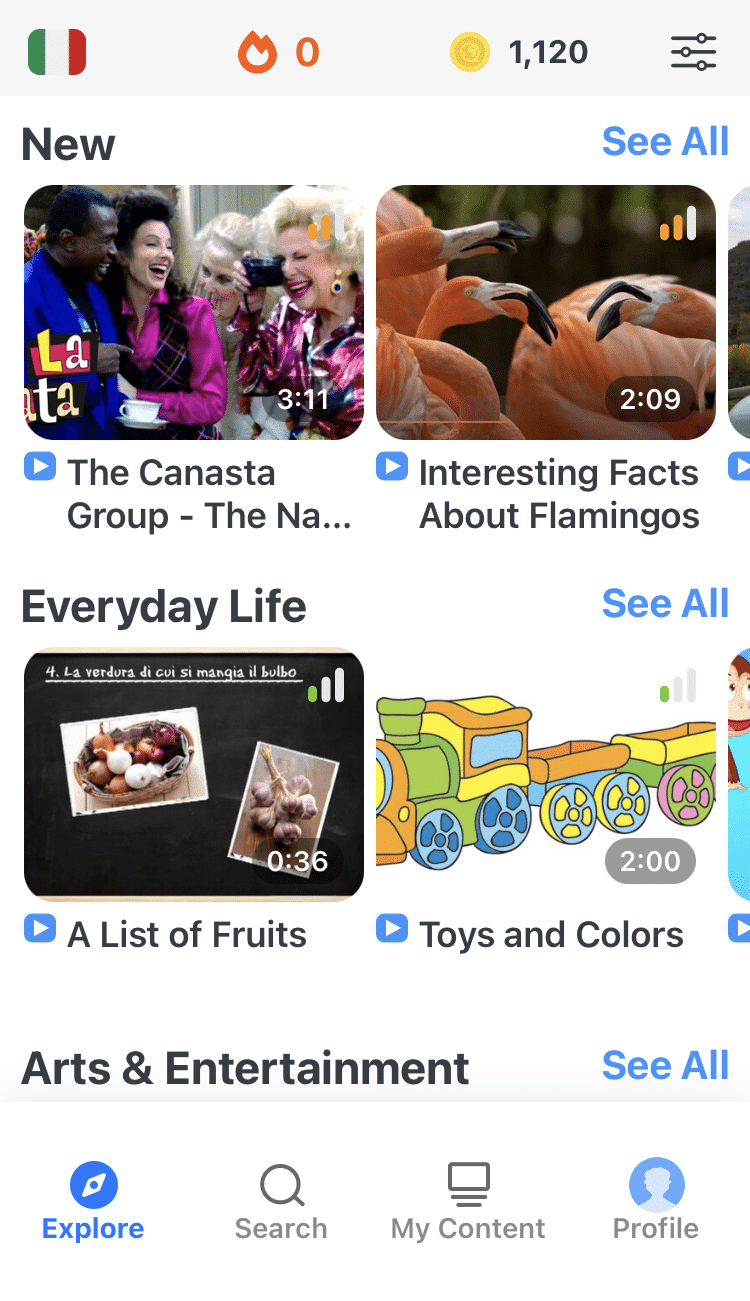
FluentU helps you get comfortable with everyday Italian by combining all the benefits of complete immersion and native-level conversations with interactive subtitles. Tap on any word to instantly see an image, in-context definition, example sentences and other videos in which the word is used.
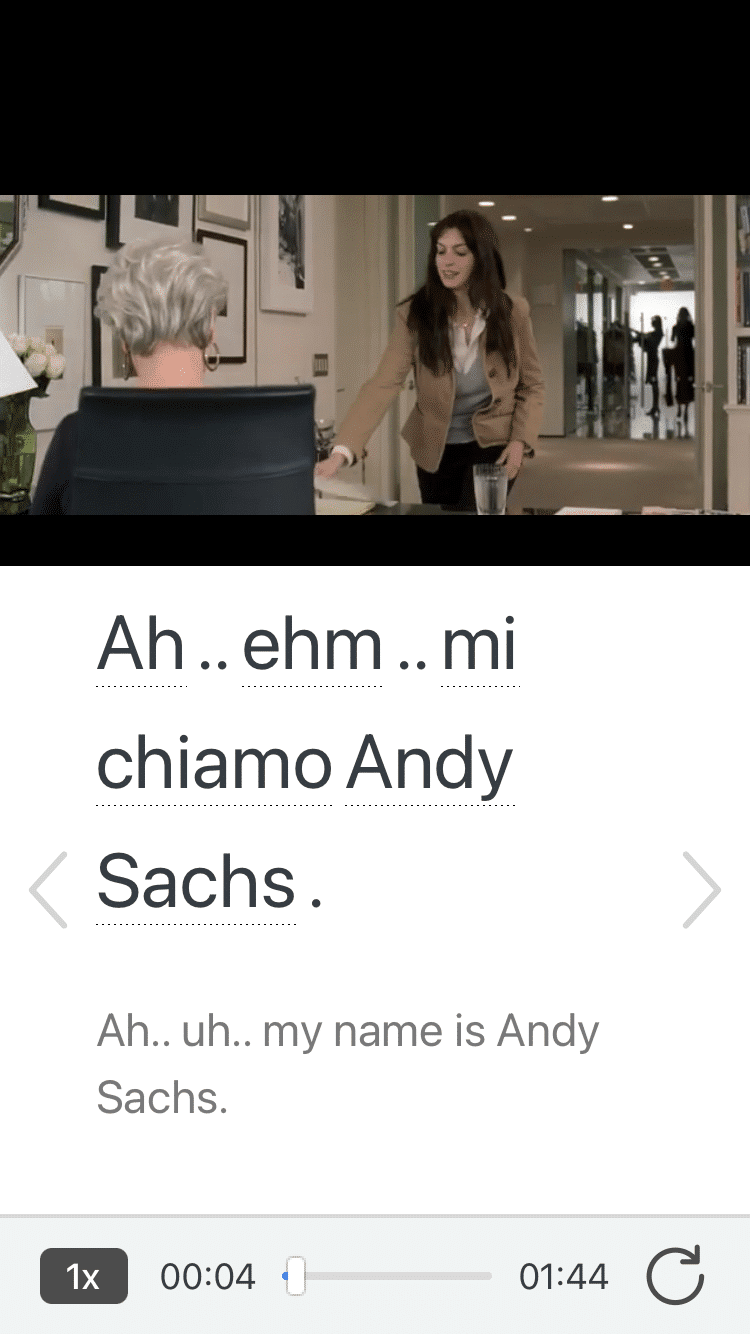
Access a complete interactive transcript of every video under the Dialogue tab, and review words and phrases with convenient audio clips under Vocab.
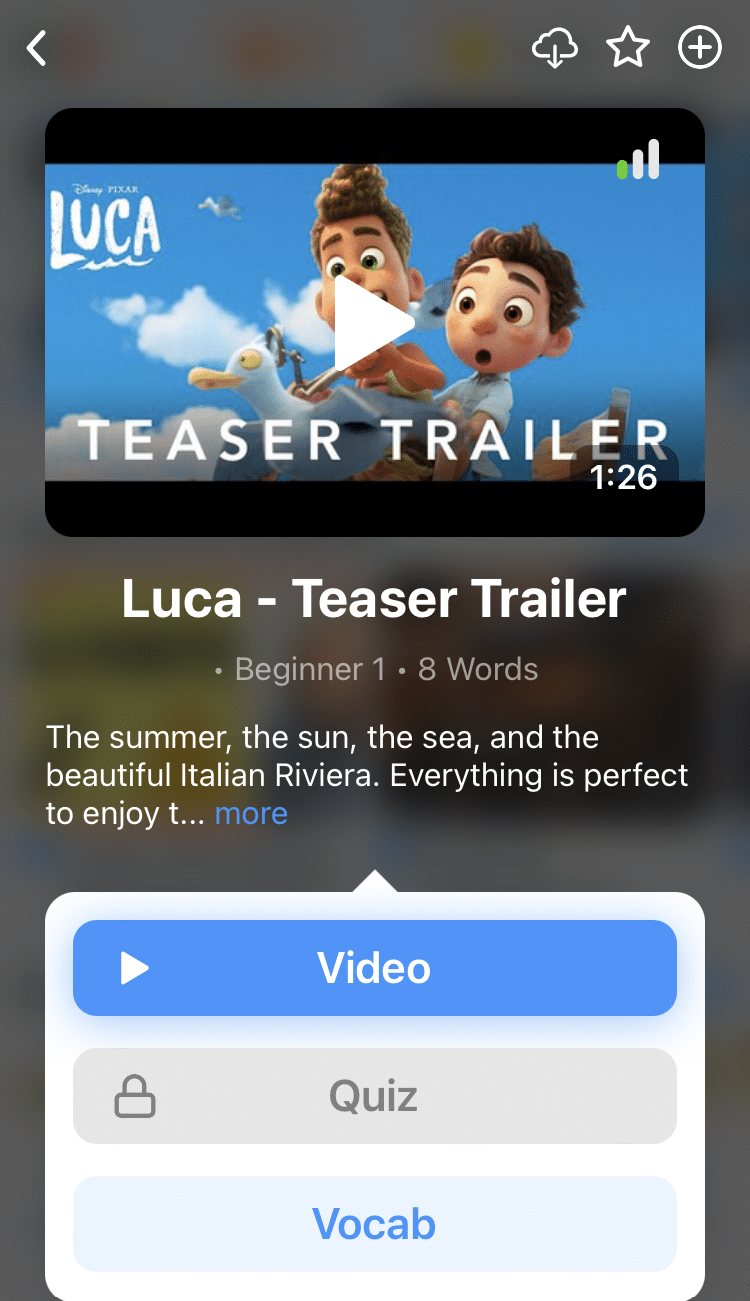
Once you've watched a video, you can use FluentU's quizzes to actively practice all the vocabulary in that video. Swipe left or right to see more examples of the word you’re on.
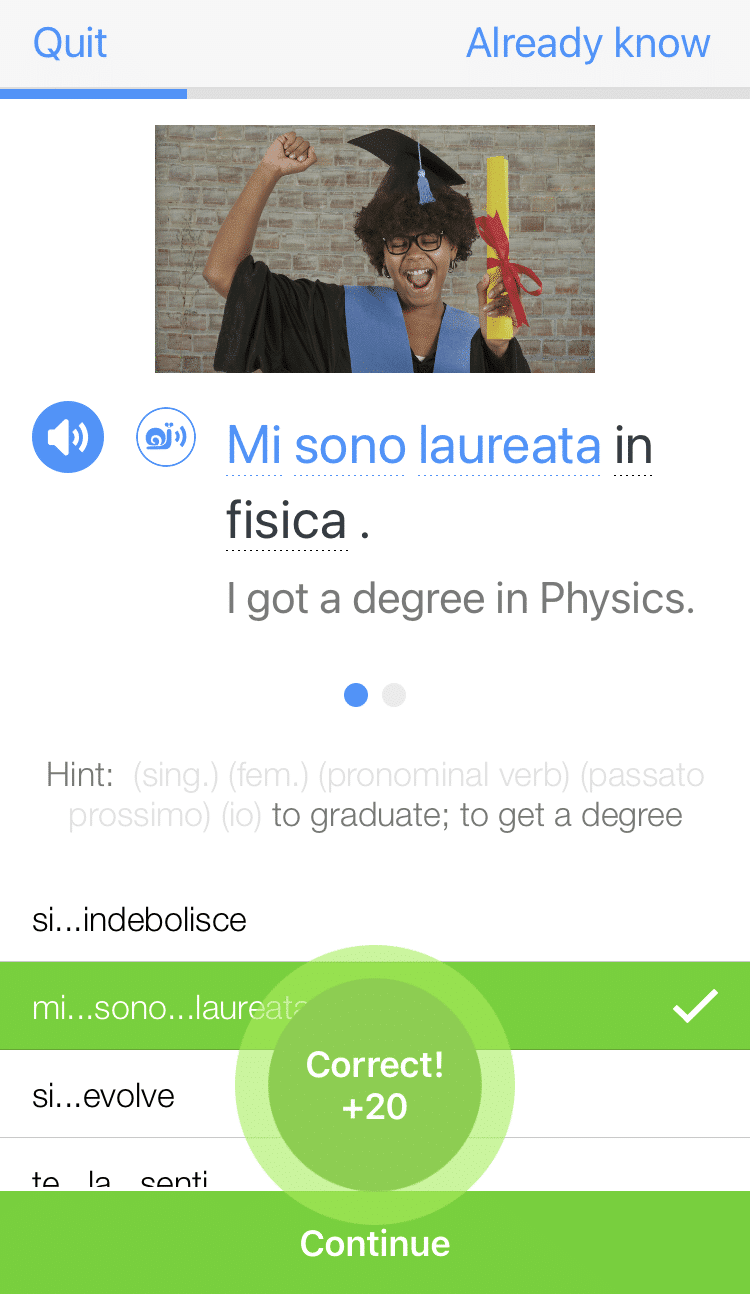
FluentU will even keep track of all the Italian words you’re learning, and give you extra practice with difficult words. Plus, it'll tell you exactly when it's time for review. Now that's a 100% personalized experience!
The best part? You can try FluentU for free with a trial.
Start using the FluentU website on your computer or tablet or, better yet, download the FluentU app from the iTunes or Google Play store. Click here to take advantage of our current sale! (Expires at the end of this month.)









